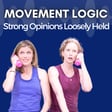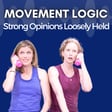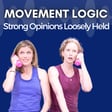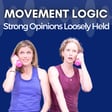
101: 6 Takeaways from Running a Marathon that Apply to Any Exercise Goal
In this episode of the Movement Logic Podcast, Laurel shares six universal takeaways from training for and running her first marathon—and how they apply to any long term, challenging, exercise-related goal. Whether your goal is to build strength, increase stamina, or just feel more capable in your daily life, this episode explores fundamental training principles, helpful mindset coaching, and empowering tips to help you reach a long-term, physically demanding goal.
Rather than focusing on the details of marathon training, Laurel distills what she learned about goal-setting, accountability, program design, recovery, and the fatigue that can sometimes hide progress. She also calls out the overwhelming and often contradictory fitness advice targeted at women, especially during perimenopause and menopause, and urges a more individualized and practical approach to training.
Sign up for our Bone Density Mini Course: Barbell 101!
Follow us on Instagram @movementlogictutorials
00:58 Why I trained for a marathon and what I learned
04:17 Takeaway #1: Have a realistic, measurable goal
13:34 Takeaway #2: Programming is a hypothesis
21:05 Takeaway #3: Accountability helps you follow through
27:50 Takeaway #4: Fatigue can mask your progress
35:45 Takeaway #5: Recovery reveals your fitness
42:00 Takeaway #6: Strength supports everything
RESOURCES
Episode 9: What Are the Best Exercises for Strength?
Episode 85: Inbetweenie - Boosting Recovery: What Really Works
Episode 70: Inbetweenie - Do you need a deload week?
Episode 90: Capacities for Longevity Part 1: Strength
Episode 94: Capacities for Longevity Part 2: Power
Episode 98: Capacities for Longevity Part 3: Cardio



